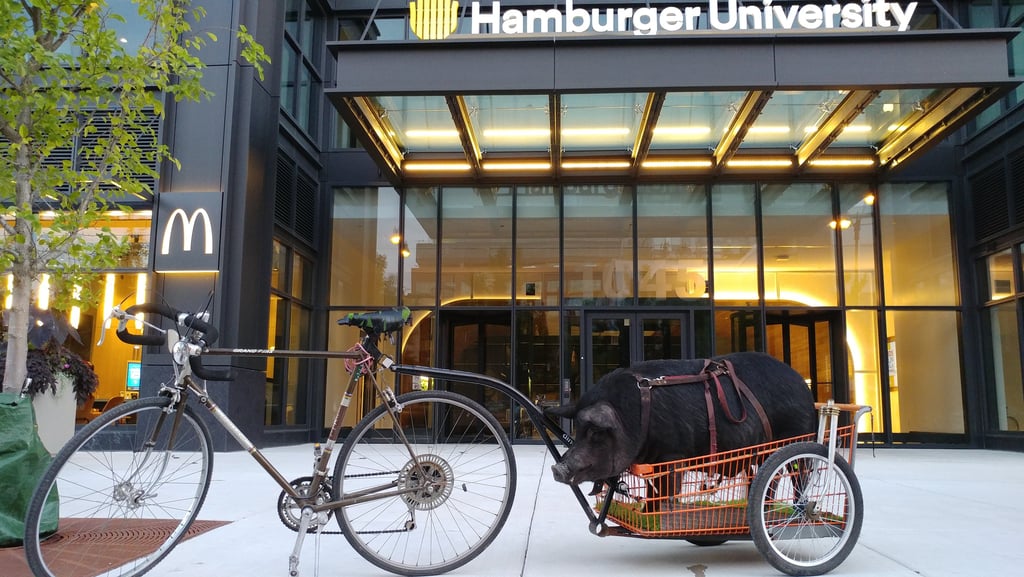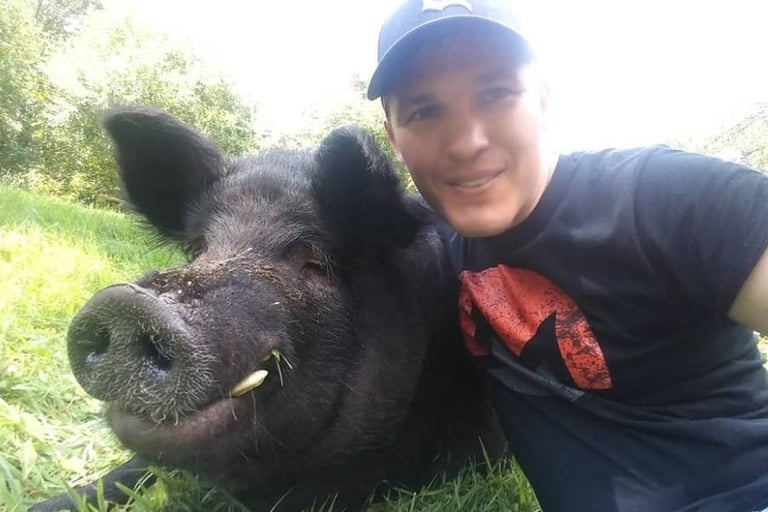Why I lost a federal lawsuit on ESA species restriction 18-cv-6211 / 19-3208
TLDR: Wrong Standard, did not explain Wiggum's working function, COVID-19


Mayle v. Chicago Park District: A Case Study in Service Animal Law and Religious Freedom
In 2018, Kenneth Mayle filed a lawsuit (Mayle v. Chicago Park District, et al., No. 1:18-cv-06211, N.D. Ill.) that challenged how we define service animals, public access rights, and religious freedom under U.S. law. The case centered on Mayle’s Guinea Hog, Chief Wiggum, a 150–200 lb. animal he claimed was both a service animal for his bipolar disorder and a vital part of his Satanist religious practices. This blog post dives into the case, its legal outcomes, and how a deeper explanation of Wiggum’s unique role might have changed the result.
The Case: A Pig in the Park
Kenneth Mayle, a Chicago resident, alleged that the City of Chicago, Chicago Park District (CPD), and other entities violated his rights by barring Chief Wiggum from public spaces like North Avenue Beach, Montrose Beach, Millennium Park, and Grant Park. Mayle argued Wiggum wasn’t just a pet but a trained service animal who helped manage his bipolar disorder through physical tasks—offering resistance for exercise via a custom-built shopping cart/chariot system Mayle designed for bike-pulled workouts, and providing therapeutic “massages” to alleviate anxiety and depression. He also tied Wiggum’s role to his Satanist beliefs, claiming the hog was integral to his spiritual practices.
Mayle’s complaint raised five claims:
Americans with Disabilities Act (ADA): Against the City, CPD, and Cook County Animal Control, seeking recognition of Wiggum as a service animal and reasonable accommodation for park access.
Illinois Human Rights Act (IHRA): Against the City and Illinois Department of Natural Resources (IDNR) for similar access violations.
Equal Protection (Fifth/Fourteenth Amendment): Against the U.S. Attorney General, challenging ADA regulations limiting service animals to dogs and miniature horses.
First Amendment Free Exercise: Against the City and IDNR, alleging the bans burdened his religious practices.
Religious Land Use and Institutionalized Persons Act (RLUIPA): Against the City and IDNR, claiming a substantial burden on his religious exercise.
The case reached a turning point in July 2019 when Judge Harry D. Leinenweber ruled on motions to dismiss. Some claims, like the ADA reasonable accommodation against the City and CPD, initially survived, but others were dismissed for procedural or legal reasons. Ultimately, the case faltered at summary judgment, and the Seventh Circuit affirmed the district court’s rulings.
Legal Standards: Rational Basis vs. Strict Scrutiny
One of Mayle’s key reflections was that the court applied the wrong standard—rational basis instead of strict scrutiny—for his Equal Protection and religious claims. Let’s break this down.
Equal Protection and Rational Basis
Mayle challenged the ADA’s regulation (28 C.F.R. § 36.104) limiting service animals to dogs and miniature horses, arguing it unfairly excluded Wiggum. The court applied rational basis review, the lowest level of scrutiny, because individuals with disabilities aren’t a “suspect class” under Equal Protection law (City of Cleburne v. Cleburne Living Ctr., 473 U.S. 432 (1985)). This standard only requires the regulation to be rationally related to a legitimate government interest—like public safety or hygiene. The court found the species limitation easily met this bar, citing risks like disruptions from non-traditional animals (Mayle’s own filings noted incidents involving Wiggum).
Could strict scrutiny (requiring a compelling interest and narrow tailoring) have applied? Possibly, if Mayle had framed a “hybrid rights” claim, combining Equal Protection with Free Exercise. Courts have occasionally applied stricter scrutiny when neutral laws indirectly target religious practices (Church of Lukumi Babalu Aye v. City of Hialeah, 508 U.S. 520 (1993)). If Mayle had shown the species rule disproportionately harmed his Satanist use of Wiggum as a ritual companion, it might have triggered a higher standard. Unfortunately, the complaint didn’t clearly tie these threads, and pleading gaps led to dismissal.
Religious Claims and Strict Scrutiny
For the First Amendment Free Exercise claim, the court followed Employment Division v. Smith (494 U.S. 872 (1990)), which holds that neutral, generally applicable laws don’t violate Free Exercise, even if they burden religion, unless they target faith or involve hybrid rights. Mayle didn’t specify the exact ordinances (e.g., park rules) or show that they targeted his Satanism, so strict scrutiny wasn’t triggered. The RLUIPA claim failed outright because the statute only applies to land use regulations (like zoning), not public access rules.
A stronger religious argument, explicitly linking Wiggum’s role to Satanist rituals and tying it to the Equal Protection claim, might have pushed for strict scrutiny under a hybrid theory. This could have forced defendants to justify the species rule as the least restrictive means to a compelling end—a much tougher test. Wiggum even appeared in the documentary "Hail Satan?". Wiggum and Mayle appeared in the "Chicago" scene but not formally in the credits.
Wiggum’s Unique Role: A Missed Opportunity
Mayle believes the court misunderstood Wiggum’s role, focusing on his “massage therapy” and “emotional support” aspects while overlooking his physical utility. Wiggum’s 150–200 lb. form factor and custom chariot system were designed for resistance-based exercise, a task dogs or miniature horses couldn’t replicate due to their size. Mayle argues this wasn’t just about Wiggum’s “presence” but his literal use as therapeutic equipment, integrated with a bike-pulled cart for cardio and strength training to manage bipolar symptoms.
The court classified Wiggum’s tasks as emotional support, which the ADA excludes from service animal status (28 C.F.R. § 35.136). But a clearer explanation—backed by evidence like chariot blueprints, exercise logs, or medical testimony on bipolar-exercise links—could have reframed Wiggum as performing “work or tasks” directly mitigating Mayle’s disability, akin to a dog pulling a wheelchair. Courts have upheld creative accommodations when well-documented (McCullum v. Orlando Reg’l Healthcare Sys., 768 F.3d 1135 (11th Cir. 2014)). The initial survival of the ADA accommodation claim suggests the court was open to this argument; more detail might have swayed summary judgment.
Why It Matters
This case highlights the ADA’s rigid service animal definition and its tension with individual needs and religious freedom. Mayle’s innovative use of Wiggum pushed legal boundaries, but the lack of specificity in pleadings and evidence limited his success. For others with non-traditional service animals, this underscores the need for:
Detailed Documentation: Blueprints, training records, or expert affidavits can prove a task’s necessity.
Hybrid Rights Arguments: Combining religious and equality claims may trigger stricter scrutiny.
Creative Accommodations: Courts are open to reasonable, well-justified accommodations, even if unconventional.
Mayle’s case didn’t fully succeed, but it spotlighted gaps in disability and religious freedom law. For those navigating similar issues, consider consulting legal counsel or exploring the Religious Freedom Restoration Act (RFRA) for federal claims, which has a broader scope than RLUIPA.
Personal Note:
At the time of writing this blog post, Chief Wiggum (aka Boarpjmet) is alive and well. He turned 10 this year. Most pigs don't live past three. That makes him around 300 years old in pig years. I was told by a well-respected journalist that there was a story pitch to Vice News; however, before authorizing the project went bankrupt and was not revisited. I'd love to work with anyone interested in Wiggum and my story. I would like to revisit this case and see if we can correct the errors made. This case was not submitted for Supreme Court Writ of Certiorari review due to issues in the world at the time it needed to be petitioned; COVID-19 turned the world upside down. With what I know about litigation now, I bet I'd win this case if I had a second chance.

